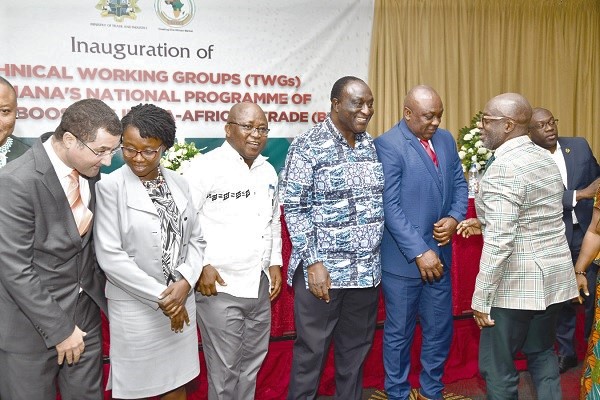The Minister of Trade and Industry, Mr Alan Kyerematen, has inaugurated seven Technical Working Groups (TWGs) to spearhead the development of the country’s national programmes of action for Boosting Intra-African Trade (BIAT).
The BIAT framework will take advantage of the African Continental Free Trade Area (AfCFTA) agreement.
The TWGs are expected to develop strategic programmes and activities that will help the government domestically address key constraints and challenges facing intra-African trade to allow the country to harness the full benefits of the AfCFTA.
The groups are made up of senior officials nominated to represent lead institutions mandated to facilitate the implementation of the AfCFTA.
They are expected to develop and support the implementation of the national action plan for BIAT.
A National BIAT Steering Committee, made up of the heads of the seven TWGs, has also been tasked to oversee the work of the TWGs.
Inauguration
Inaugurating the TWGs in Accra yesterday, Mr Kyerematen explained that it would not be possible to harness the benefits of the single continental market without conscious efforts geared towards increasing trade among member nations.
BIAT in focus
He said African Heads of State had adopted the action plan for BIAT as the framework to guide the implementation of the AfCFTA.
The BIAT covers seven priority clusters and include addressing inconsistent trade policies, inadequate facilitation of trade, enhancement of production capacity, trade-related infrastructure, availability of trade finance, trade information and factor market integration.
“The AfCFTA framework is only providing market access opportunity for African countries that have ratified the agreement to allow them to take advantage of the African market, but it doesn’t mean that once you have ratified the agreement, the benefits of the AfCFTA will automatically accrue to your country,” the Trade Minister said.
He said BIAT required the adoption and implementation of coherent trade policies at the national, regional and continental levels geared towards boosting trade among member nations beyond the legal framework of the AfCFTA.
Ghana’s journey
In Ghana, Mr Kyerematen said, the outcome and findings of the working groups would feed into the national action plan for harnessing the benefits of the AfCFTA.
“You need an action plan that will identify the specific market information and products that are to be exported to different countries and you need all of these interventions to enable you to benefit, as a country, from the AfCFTA.
“So, by constituting these technical working groups, we are working towards identifying the specific proposals or recommendations in different thematic areas that will help Ghana benefit from the AfCFTA,” he said in an interview with the Daily Graphic after the inauguration.
He explained that the government’s main objective, and which is a priority, was to aggressively pursue industrial transformation policies and programmes that supported the private sector to add value to Ghana’s exports, develop capacity to effectively compete with imports and expand opportunities for job creation.
Source: Graphic Online





